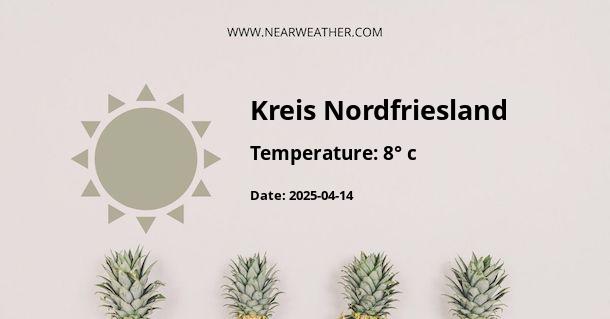Understanding Kreis Nordfriesland's Climate and Weather Patterns
The district of Nordfriesland, located in Schleswig-Holstein, northern Germany, experiences a temperate maritime climate that is significantly influenced by its proximity to the North Sea. This unique geographical setting imparts distinctive weather characteristics to the region, making a study of its climate both fascinating and complex. In this content, we will delve into the specifics of Nordfriesland's climate, analyze monthly temperature variations, precipitation levels, and other meteorological phenomena pertinent to the district.
Geographic and Climatic Overview of Kreis Nordfriesland
Nordfriesland is a coastal district that extends from the mainland out to several islands and includes part of the Wadden Sea, a UNESCO World Heritage Site. The interaction between land and sea here plays a critical role in shaping the local climate. With the North Sea's vast expanse, the region is exposed to prevailing westerly winds, which transport maritime air masses and are responsible for the moderate temperatures and high humidity characteristic of this territory.
Seasonal Temperature and Precipitation Patterns
- Winter: Winters are relatively mild due to the maritime influence, with average temperatures often hovering around the freezing point. Snowfall is possible but not as common as in the more continental parts of Germany.
- Spring: As spring progresses, temperatures start to rise, though the North Sea can delay the warming process compared to inland areas. This season often experiences variable weather with a mixture of sunny days and rain.
- Summer: Summers are cool to mild with occasional warm spells. Daytime temperatures can reach highs around 20-25°C (68-77°F), while night-time low temperatures can drop slightly, ensuring pleasant sleeping conditions.
- Autumn: Autumn brings more substantial rainfall and wind, with conditions gradually getting cooler as the season advances. The influence of the sea can sometimes temper early frosts, prolonging the autumn season.
Monthly Climatic Averages: Temperature and Precipitation
| Month | Average High (°C) | Average Low (°C) | Precipitation (mm) |
|---|---|---|---|
| January | 3 | 0 | 78 |
| February | 3 | -1 | 49 |
| March | 6 | 1 | 65 |
| April | 10 | 4 | 43 |
| May | 15 | 8 | 57 |
| June | 18 | 11 | 88 |
| July | 20 | 13 | 80 |
| August | 20 | 13 | 87 |
| September | 17 | 11 | 91 |
| October | 12 | 7 | 87 |
| November | 7 | 4 | 85 |
| December | 4 | 1 | 87 |
Note: The table provided gives a general outline of the average high and low temperatures, along with the average precipitation levels for each month. These figures are approximate and derived from historical climate data. The actual conditions can vary from year to year.
Winds and Storm Incidences
The coastal and island parts of Nordfriesland are particularly subject to strong marine influences, which means that wind speeds can be considerable, especially during autumn and winter months. Winds from the western directions predominate, occasionally leading to storm surges and coastal flooding.
Storms are an essential aspect of the regional climate. In particular, the so-called "St. Peter Ording" and other North Sea storms can have a profound impact on the region, causing not only immediate weather disruptions but also longer-term effects on the coastal geography.
Climate Adaptations and Future Predictions
Residents and authorities in Nordfriesland are adept at coping with the challenges posed by the local weather and are continually improving infrastructure to mitigate the effects of severe weather events. The region's climate resilience is bolstered through robust coastal defenses against storm surges, sustainable practices in agriculture suited to local conditions, and the conservation of wetland areas to act as natural flood management systems.
Regarding climate change, Nordfriesland, like the rest of the world, is expected to experience shifts in its weather patterns. Models predict an increase in average temperatures, changes in precipitation distribution, and a potential rise in the frequency and intensity of storms.
Summarizing Nordfriesland's Unique Weather Patterns
If there is one defining characteristic of Kreis Nordfriesland's climate, it is its dynamic nature shaped by the tempering effects of the North Sea. Whether it is the mild yet variable winters or the cool summers, the climate here is marked by its maritime influences. While coastal weather systems bring a degree of unpredictability, the richness of the weather patterns contributes to the natural beauty and diversity of the region's landscapes.
The interplay between the North Sea, the unique geography, and the shifting climate patterns indeed makes Nordfriesland's climate a topic of perennial interest to meteorologists, climate scientists, and the public alike.
A - Kreis Nordfriesland's Latitude is 54.583889 & Longitude is 8.967500.
A - Weather in Kreis Nordfriesland is 8° today.
A - Climate Conditions in Kreis Nordfriesland shows broken clouds today.
A - Humidity in Kreis Nordfriesland is 93% today.
A - Wind speed in Kreis Nordfriesland is 8.32 km/h, flowing at 198° wind direction. today.
